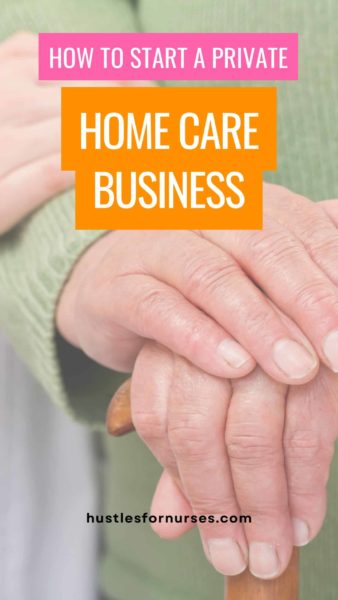How To Start A Private Home Care Business: Steps To Starting Your Own Agency
Starting your own private home care business can be a very rewarding experience, both personally and financially.
It can also be a lot of work, but with the right planning and preparation, it can be a smooth process.
This post may contain affiliate links, which means we may receive a commission at no extra cost to you, if you make a purchase through a link. Please see our disclosure policy for more information.
In this blog post, we will outline the steps that you need to take in order to start your own home care agency. We will also provide you with some helpful resources that can assist you along the way!
This post is for general informational and educational purposes only. You can read the full disclaimer for more information.
Plan your business
Familiarize yourself with Medicare and Medicaid.
The first step is to determine which medical services are covered by either Medicare or Medicaid. These two government programs are the largest payers of assisted-living care in the United States.
Medicare is a federal health insurance program for:
- People who are 65 or older
- Certain younger people with disabilities
- People with End-Stage Renal Disease (ESRD)
Medicare has three parts:
- Medicare Part A (Hospital Insurance) – covers inpatient hospital stays, care in a skilled nursing facility, hospice care, and some home health care.
- Medicare Part B (Medical Insurance) – covers certain doctor’s services, outpatient care, medical supplies, and preventive services.
- Medicare Part D (prescription drug coverage) – helps cover the cost of prescription drugs.
Medicaid is run by individual states, according to federal requirements. The program is funded jointly by states and the federal government.
Medicaid provides health coverage to eligible low-income adults, children, pregnant women, elderly adults, and people with disabilities.
States can offer a variety of unlimited services under a Home & Community-Based Services (HCBS) Waiver program. Programs can provide a combination of standard medical services and non-medical services.
Standard services include but are not limited to case management (i.e. support and service coordination), homemaker, home health aide, personal care, adult day health services, habilitation (both day and residential), and respite care.
States can also suggest “other” types of services to assist in diverting and/or transitioning people from institutions into their homes and communities.
In sum, Medicare covers a variety of home care services, including physical and occupational therapy, the administration of medicine, and medical equipment.
However, it does not cover daily living care, like bathing or dressing, or homemaking services, like meal preparation or cleaning.
Medicaid coverage varies greatly by state, but usually covers ADLs and iADLs, medical supplies, and part-time nursing. Figure out which aspects of a private home care business are covered by these programs in your area.
This will help you tailor your services such that they are entirely or mostly free to your clients.
To locate seniors in your area, do a demographic study.
Senior citizens are the demographic in greatest need of in-home care. You can use the US Census explorer or maps feature. You can also use this map to work backward. Use this data in conjunction with what you already know about your local areas.
This will help determine your service area. You want to know what are the future estimates about the number of seniors in a given area. Is it going up, down, or staying level? If it is holding steady or increasing, an in-home caregiving business would do well in that area.
Decide what services your business will offer.
Professional caregivers may provide in-home services that are medical or non-medical. Either type of caregiving business may offer a variety of potential services.
If you operate a medical caregiving company, you’ll need to hire qualified nurses, certified nursing assistants, physical or occupational therapists, and other medical professionals. This will likely be in addition to the more basic caregiving duties.
Non-medical in-home caregiving, on the other hand, may include helping with activities of daily living like bathing, dressing, eating, getting in or out of a bed or chair, moving around, and using the bathroom. It may also include services like giving eye drops.
Keep in mind there will also be different regulations for medical and non-medical home health agencies so it’s important to know what services you will offer before moving forward.
Consider opening a franchise
This is an option if you want to get your home health care business up and running quickly. You’ll have the support of an existing company and brand. The downside is that you will have less control over how your business is run and it may be more expensive than starting your own home caregiving business from scratch.
Here’s a quick look at some of the possible pros and cons:
| Pros | Cons |
| Done-for-you business plan | Limited control |
| Help getting started | High startup costs |
| Vendor relationships | Owner may sell |
| No experience necessary | Can’t control your reputation |
Write your business plan
Once you have an idea of what services you want to offer and who your target market is, it’s time to start writing your business plan. This will be a living document that outlines your business goals, strategies, and how you plan on achieving them.
There are a few key things you’ll want to include:
- Your business model
- Your target market
- Your marketing and sales strategy
- Your team
- Your financials
Note: when hiring a team make sure to investigate new wage laws that could affect your ability to pay your employees.
You’ll also want to draft policies and procedures for your business. This will ensure that everyone is on the same page and that your clients receive consistent, high-quality care.
If you’re not sure where to start, there are a number of resources available to help you write a business plan. The Small Business Administration has a number of helpful templates and tools, or you can hire a professional to help you.
Determine your business structure
The next step is to decide what type of business entity you’ll be. This includes a sole proprietorship, partnerships, limited liability companies (LLCs), and corporations. Obtain your federal employer identification number or federal tax identification number, a unique nine-digit number assigned by the Internal Revenue Service (IRS) to business entities operating in the United States.
There are a number of factors to consider when making this decision, including the size and scope of your business, the amount of money you have to invest, and your personal risk tolerance.
You will want to consult with an attorney or accountant to make sure you are making the best decision for your business.
Start your business
Register your business, get licenses, and permits
The next step is to come up with a business name that isn’t already taken. You can search trademark database. You’ll register your business with the state and local government, as well as get any licenses or permits that may be required.
Medical caregiving agencies will require additional Medicare certifications and Medicaid certifications.
For medical home health care services, an application for state licensure as a home health care agency is a requirement for federal certification. Here’s an application for the state of Pennsylvania to give you an idea of what to expect.
After review and acceptance of the application materials and notification from the Centers for Medicare and Medicaid Services (CMS) of the approval. The department will conduct a survey before recommending the agency for Medicare certification.
You can also check out this FAQ pdf from the CMS for more information.
Non-medical caregiving agencies, by definition, will generally not require medical licensing.
Requirements for specific licenses and registration processes vary by state.
Check with your state’s Department of Health for specifics about your business. This list of Medicaid info sorted by the state should give you a head start.
Additional details include filling out tax forms with the internal revenue service and drafting a payroll. Be sure all your employees can legally work in the United States. You may want to set up direct deposit lines to save yourself the trouble of dealing with paper paychecks.
This can be a complicated process, so it’s important to do your research and include your attorney or accountant to make sure you are taking care of everything that is required.
Obtain sufficient liability coverage
You and your employees will be working in the home health care industry with an elderly population, and unfortunately falls are frequent in older adults. Which places home health care businesses at risk for potential lawsuits.
Negligence, for instance, is a common claim against home care companies. The best way avoid costly lawsuits is to make sure you have adequate insurance coverage. Policies that may pertain to your home healthcare business type include:
- General liability insurance
- Business owner’s policy
- Professional liability insurance
- Commercial auto insurance
- Cyber liability insurance
- Workers’ compensation insurance
You may also want to encourage your employees to obtain Professional Liability insurance coverage themselves.
Set your service rates
Before setting your service rates, check out other caregiving services in the area to get an idea of what the going rate is. You’ll want to be competitive, but also make sure you are charging enough to cover your overhead costs and generate a profit.
There are a few different ways you can structure your pricing. You can charge by the hour, by the day, or by the visit. You may want to offer discounts for longer-term contracts.
You also need to be aware of Medicare and Medicaid reimbursement limits, as well as major insurers in your area.
Hire your team
Whether you are hiring for medical or non-medical services you want to be sure your employees have the proper qualifications.
You can verify most medical professional licenses by conducting a search on the Department of State website for your particular state.
You can offer caregiver training to non-medical staff like home health aides (HHA). The American Caregiver Association (ACA) offers a national caregiver certification course. This will demonstrate to your clients that you are concerned with the quality of care provided.
You want to conduct background checks on all employees. Bonding your employees is also a good idea.
Purchase supplies and equipment
Depending on what services you offer, you’ll need to purchase the proper supplies and equipment.
For example, if you offer light housekeeping services, you will need to purchase cleaning supplies. If you provide in-home general nursing services, you’ll need to have a supply of medical supplies on hand.
Take your time looking for a good wholesale vendor. You want a vendor that offers quality supplies at a good price. You may want to sign up for a business credit card to get discounts on your purchases.
You’ll likely need to invest in some type of software or technology system to help you manage your business.
There are a number of software programs available that can help you with scheduling, billing, and client management. Research different options and find one that fits your needs and budget.
Market your business
You can use social media, online directories, and print advertising in your marketing plan.
Setting up a booth at a local expo for seniors or health fairs are great ways to get the word out about your business. You’ll also get to network with other business owners that may offer a complementary service to your business.
Attend local or regional medical conferences. Introduce yourself to case managers and social workers that help with hospital discharges. Hand out your business cards and a brochure with information about your company.
Explain that your business is expanding and looking for new clients. They’re always looking for quality home care providers for their clients.
Accept as many offers for your own home care business as possible. Your happy clients will then refer other potential clients to you.
Funding your business
Finally, you’ll need to have some start-up capital to get your business off the ground. You may want to consider a small business loan or line of credit.
You can also look into government grants that are available for small businesses. The Small Business Administration (SBA) has a number of programs that offer financial assistance to small businesses.
How to start a private home care business takeaways
If you are thinking about starting a private home care business, there are a few things you need to do.
First, research the going rate for caregiving services in your area. You will want to be competitive, but also make sure you are charging enough to cover your overhead costs and generate a profit.
Second, hire qualified employees and conduct background checks. You’ll also need to purchase supplies and equipment, and market your business.
With some start-up capital and a bit of planning, you can be well on your way to starting a successful home care business.
I’d love to know if you found this post helpful. Let me know in the comments! And if so, please share it with others who might benefit from the information.













